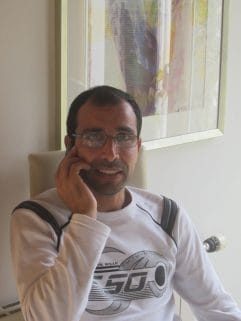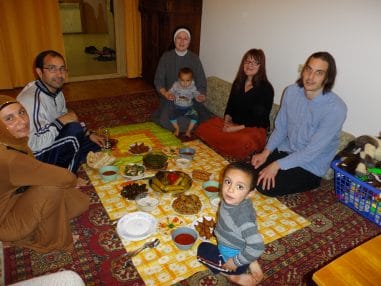 “I had to leave everything behind: my wife, two small children and my country. On the other hand, I didn’t have a choice. Being young and a teacher, I would have had to follow ISIS and spread its ideas. But since I opposed it, if I had remained there they would have murdered me.” When Mohamed reached Graz, Austria, like many other immigrants he was parked in a refugee camp, doing nothing for months and having absolutely no contact with the outside world. “We felt so isolated and depressed,” he recounts, “but then somebody did begin to show an intererst in us.” It was the local Focolare community which, through the mediation of a Syrian friend who had been living in Graz for three years, invited 40 of the Syrian refugees from the camp to to get together at a parish hall. This gave them the opportunity to present their precise needs: to learn the language and find a job. The community got to work and in a short time managed to put together a German lanugage course. Some gave money for books, one woman was able to find 15 bicycles from neighbours, which she had repaired at her own expense for the students that had to travel 10 km to attend the lessons. Others found odd jobs for them fixing up houses and doing gardening work. “We finally had something useful that we could do,” Mohamed whispered with relief. “Finally someone took us by the hand and appreciated us.” A friendship began that only deepened and became more heartfelt. It was only logical to get together, to share meals with one another and also to begin a cultural and religious dialogue. The first step was to attend the mosque together where they met many other people. Once, they were more than 400: “It was a great thing for us,” Mohamed confided. “Finally, we were able to feel like ourselves, there we could forget about what had happened to us and enter into direct contact with God. Sharing this moment with Muslims and Christians together made us feel even closer to one another.”
“I had to leave everything behind: my wife, two small children and my country. On the other hand, I didn’t have a choice. Being young and a teacher, I would have had to follow ISIS and spread its ideas. But since I opposed it, if I had remained there they would have murdered me.” When Mohamed reached Graz, Austria, like many other immigrants he was parked in a refugee camp, doing nothing for months and having absolutely no contact with the outside world. “We felt so isolated and depressed,” he recounts, “but then somebody did begin to show an intererst in us.” It was the local Focolare community which, through the mediation of a Syrian friend who had been living in Graz for three years, invited 40 of the Syrian refugees from the camp to to get together at a parish hall. This gave them the opportunity to present their precise needs: to learn the language and find a job. The community got to work and in a short time managed to put together a German lanugage course. Some gave money for books, one woman was able to find 15 bicycles from neighbours, which she had repaired at her own expense for the students that had to travel 10 km to attend the lessons. Others found odd jobs for them fixing up houses and doing gardening work. “We finally had something useful that we could do,” Mohamed whispered with relief. “Finally someone took us by the hand and appreciated us.” A friendship began that only deepened and became more heartfelt. It was only logical to get together, to share meals with one another and also to begin a cultural and religious dialogue. The first step was to attend the mosque together where they met many other people. Once, they were more than 400: “It was a great thing for us,” Mohamed confided. “Finally, we were able to feel like ourselves, there we could forget about what had happened to us and enter into direct contact with God. Sharing this moment with Muslims and Christians together made us feel even closer to one another.”  Four Muslims attended the summer Mariapolis, which coincided with the end of Ramadan and was celebrated by all with Arab music, dancing and Syrian sweets. During those days Mohamed learned of his mother’s death. It was a moving occasion to pray together for her and to recite some Psalms that respected everyone’s feelings. Trying to understand another person’s pain is also a form of dialogue. Mohamed then asked the Authorities for permission to reunite with his family in Austria, which turned out to be very complicated. His wife went on foot 22 times for 7 hours amidst cold, hunger and danger to the border – and was promptly sent back. Once she was even locked up in prison. But she finally managed to cross. Thus the long awaited family reunion drew nearer, but it was suggested that they settle in Vienna rather than Graz. Mohamed regretfully left his friends in Graz, unaware of the warm acceptance that would also receive amongst the Focolare community in the capital, which had been notified of his arrival. The community got busy finding a place for the family to live, which was not easy due to the scarcity of housing. They thought of some women religious friends who ran a home for the elderly. In just one day there was already a positive response thanks to a reassuring conversation with the Focolare members. So, now it’s been two months that Mohamed and his family have been living with the Catholic reverend sisters, without any inconvenience for either side: the sisters, acknowledging and respecting the customs of their Muslim guests and the family dwelling in a structure with many prominent Catholic signs. This is also part of dialogue and, as Mohamed declares: “Christians and Muslims, we’re truly brothers and sisters.”
Four Muslims attended the summer Mariapolis, which coincided with the end of Ramadan and was celebrated by all with Arab music, dancing and Syrian sweets. During those days Mohamed learned of his mother’s death. It was a moving occasion to pray together for her and to recite some Psalms that respected everyone’s feelings. Trying to understand another person’s pain is also a form of dialogue. Mohamed then asked the Authorities for permission to reunite with his family in Austria, which turned out to be very complicated. His wife went on foot 22 times for 7 hours amidst cold, hunger and danger to the border – and was promptly sent back. Once she was even locked up in prison. But she finally managed to cross. Thus the long awaited family reunion drew nearer, but it was suggested that they settle in Vienna rather than Graz. Mohamed regretfully left his friends in Graz, unaware of the warm acceptance that would also receive amongst the Focolare community in the capital, which had been notified of his arrival. The community got busy finding a place for the family to live, which was not easy due to the scarcity of housing. They thought of some women religious friends who ran a home for the elderly. In just one day there was already a positive response thanks to a reassuring conversation with the Focolare members. So, now it’s been two months that Mohamed and his family have been living with the Catholic reverend sisters, without any inconvenience for either side: the sisters, acknowledging and respecting the customs of their Muslim guests and the family dwelling in a structure with many prominent Catholic signs. This is also part of dialogue and, as Mohamed declares: “Christians and Muslims, we’re truly brothers and sisters.”
Put love into practice
Put love into practice




0 Comments